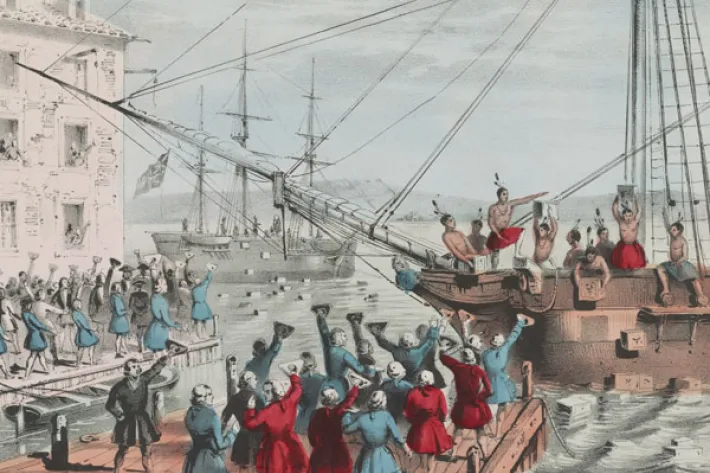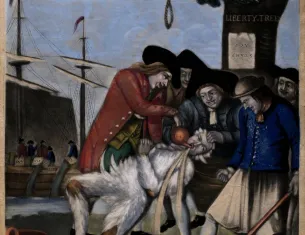John Andrews’s Eyewitness Account of the Boston Tea Party, 1773

The destruction of tea at Boston Harbor, lith. & pub. by Sarony & Major, 1843, Library of Congress
Boston merchant John Andrews describes the events of the Tea Party to Philadelphia merchant William Barrell in a December 18, 1773 letter. When his old letter was found by historians, the discoverers noted that it must have been hot news when it arrived. The letter was in tatters, which demonstrated the wear of being passed hand-to-hand many times.
Excerpt from John Andrews’s Eyewitness Account of the Boston Tea Party, 1773
. . . The house was so crouded I could get no farther than ye porch, when I found the moderator was just declaring the meeting to be dissolv’d, which caused another general shout, out doors and in, and three cheers. What with that, and the consequent noise of breaking up the meeting, you’d thought that the inhabitants of the infernal regions had broke loose. For my part, I went contentedly home and finish’d my tea, but was soon inform’d what was going forward: but still not crediting it without ocular demonstration, I went and was satisfied. They muster’d, I’m told, upon Fort Hill, to the number of about two hundred, and proceeded, two by two, to Griffin’s wharf, where Hall, Bruce, and Coffin lay, each with 114 chests of the ill fated article on board; the two former with only that article, ye latter arriv’d at ye wharf only ye day before, was freighted with a large quantity of other goods, which they took the greatest care not to injure in the least, and before nine o’clock in ye evening, every chest from on board the three vessels was knock’d to pieces and flung over ye sides. They say the actors were Indians from Narragansett. Whether they were or not, to a transient observer they appear’d as such, being cloath’d in Blankets with the heads muffled, and copper color’d countenances, being each arm’d with a hatchet or axe, and pair pistols, nor was their dialect different from what I conceive these geniusses to speak, as their jargon was unintelligible to all but themselves. Not the least insult was offer’d to any person, save one Captain Conner, a letter of horses in this place, not many years since remov’d form dear Ireland, who had ript up the lining of his coat and waistcoat under the arms, and watching his opportunity had nearly fill’d ’em with tea, but being detected, was handled pretty roughly. They not only stripp’d him of his cloaths, but gave him a coat of mud, with a severe bruising into the bargain; and nothing but their utter aversion to make any disturbance prevented his being tar’d and feather’d.
Source: John Andrews to an unknown correspondent, December 18, 1773, Letters of John Andrews, Esq., of Boston, 1772–1776, Cambridge: John Wilson and Sons, 1866, p. 13. To view full transcript, click here.
John Andrews’s Eyewitness Account of the Boston Tea Party, 1773
. . . As I could not believe it without seeing for myself, I went out and was satisfied. The Indians mustered, I’m told, upon Fort Hill, to the number of about two hundred, and proceeded, two by two, to Griffin’s wharf, where Hall, Bruce, and Coffin’s vessels lay.
Coffin’s ship had arrived at the wharf only the day before, and was freighted with a large quantity of other goods, which they took the greatest care not to injure in the least.
Before nine o’clock in the evening every chest on board the three vessels was knocked to pieces and flung over the sides. They say the actors were Indians from Narragansett. Whether they were or not, to a transient observer they appeared such.
They were clothed in blankets, with their heads muffled and copper colored faces. Each was armed with a hatchet or axe or pair of pistols. Nor was their dialect different from what I imagine the real Indians to speak, as their jargon was nonsense to all but themselves.
Not the least insult was offered to any person, except to Captain Connor, a livery-stable keeper in this place, who came across the ocean not many years since. He ripped up the lining of his coat and waistcoat under the arms, and, watching his opportunity, he nearly filled them with tea.
When detected he was handled pretty roughly. The people not only stripped him of his clothes, but gave him a coat of mud, with a severe bruising into the bargain. Nothing but their utter aversion to making any disturbance prevented his being tarred and feathered.
Source: John Andrews to an unknown correspondent, December 18, 1773, Letters of John Andrews, Esq., of Boston, 1772–1776, Cambridge: John Wilson and Sons, 1866, p. 13. To view full transcript, click here.
transient – lasting for a short time
jargon – specialized language
Background
Boston merchant John Andrews describes the events of the Tea Party to Philadelphia merchant William Barrell in a December 18, 1773 letter. When his old letter was found by historians, the discoverers noted that it must have been hot news when it arrived. The letter was in tatters, which demonstrated the wear of being passed hand-to-hand many times.
Transcript
Excerpt from John Andrews’s Eyewitness Account of the Boston Tea Party, 1773
. . . The house was so crouded I could get no farther than ye porch, when I found the moderator was just declaring the meeting to be dissolv’d, which caused another general shout, out doors and in, and three cheers. What with that, and the consequent noise of breaking up the meeting, you’d thought that the inhabitants of the infernal regions had broke loose. For my part, I went contentedly home and finish’d my tea, but was soon inform’d what was going forward: but still not crediting it without ocular demonstration, I went and was satisfied. They muster’d, I’m told, upon Fort Hill, to the number of about two hundred, and proceeded, two by two, to Griffin’s wharf, where Hall, Bruce, and Coffin lay, each with 114 chests of the ill fated article on board; the two former with only that article, ye latter arriv’d at ye wharf only ye day before, was freighted with a large quantity of other goods, which they took the greatest care not to injure in the least, and before nine o’clock in ye evening, every chest from on board the three vessels was knock’d to pieces and flung over ye sides. They say the actors were Indians from Narragansett. Whether they were or not, to a transient observer they appear’d as such, being cloath’d in Blankets with the heads muffled, and copper color’d countenances, being each arm’d with a hatchet or axe, and pair pistols, nor was their dialect different from what I conceive these geniusses to speak, as their jargon was unintelligible to all but themselves. Not the least insult was offer’d to any person, save one Captain Conner, a letter of horses in this place, not many years since remov’d form dear Ireland, who had ript up the lining of his coat and waistcoat under the arms, and watching his opportunity had nearly fill’d ’em with tea, but being detected, was handled pretty roughly. They not only stripp’d him of his cloaths, but gave him a coat of mud, with a severe bruising into the bargain; and nothing but their utter aversion to make any disturbance prevented his being tar’d and feather’d.
Source: John Andrews to an unknown correspondent, December 18, 1773, Letters of John Andrews, Esq., of Boston, 1772–1776, Cambridge: John Wilson and Sons, 1866, p. 13. To view full transcript, click here.
Excerpt
John Andrews’s Eyewitness Account of the Boston Tea Party, 1773
. . . As I could not believe it without seeing for myself, I went out and was satisfied. The Indians mustered, I’m told, upon Fort Hill, to the number of about two hundred, and proceeded, two by two, to Griffin’s wharf, where Hall, Bruce, and Coffin’s vessels lay.
Coffin’s ship had arrived at the wharf only the day before, and was freighted with a large quantity of other goods, which they took the greatest care not to injure in the least.
Before nine o’clock in the evening every chest on board the three vessels was knocked to pieces and flung over the sides. They say the actors were Indians from Narragansett. Whether they were or not, to a transient observer they appeared such.
They were clothed in blankets, with their heads muffled and copper colored faces. Each was armed with a hatchet or axe or pair of pistols. Nor was their dialect different from what I imagine the real Indians to speak, as their jargon was nonsense to all but themselves.
Not the least insult was offered to any person, except to Captain Connor, a livery-stable keeper in this place, who came across the ocean not many years since. He ripped up the lining of his coat and waistcoat under the arms, and, watching his opportunity, he nearly filled them with tea.
When detected he was handled pretty roughly. The people not only stripped him of his clothes, but gave him a coat of mud, with a severe bruising into the bargain. Nothing but their utter aversion to making any disturbance prevented his being tarred and feathered.
Source: John Andrews to an unknown correspondent, December 18, 1773, Letters of John Andrews, Esq., of Boston, 1772–1776, Cambridge: John Wilson and Sons, 1866, p. 13. To view full transcript, click here.
transient – lasting for a short time
jargon – specialized language
